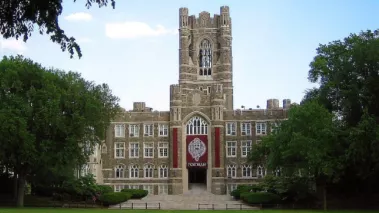Table of Contents
Fordham University sued over rejection of Students for Justice in Palestine chapter

Victor Koval / Shutterstock.com
Fordham University is facing a lawsuit in a New York state court over its refusal to recognize a chapter of Students for Justice in Palestine, which the university rejected because of a fear of “polarization” on campus. Fordham’s conduct, after promising that students would be free to express differing views on campus, was so egregious that it earned the university a spot on FIRE’s 2017 list of America’s 10 worst schools for free speech. It also earned two letters from FIRE and the National Coalition Against Censorship calling on the university to abandon its illiberal path.
As we and the NCAC summarized in our first letter to Fordham, it was Fordham’s dean of students who overruled the university’s own student government, which had agreed that the chapter should be recognized. The dean’s rationale? That “advocating political goals of a specific group” might lead to “polarization” rather than dialogue — so, better to just skip the dialogue altogether.
Private universities, like Fordham, are not bound by the First Amendment. But when a private university promises students free speech on its campus, it is morally — and in many cases legally — bound to honor those commitments. Fordham has repeatedly made promises that its students will enjoy freedom of expression, proclaiming that the “expression of controversial ideas and differing views is a vital part of University discourse.”
Censoring speech on the basis that it is divisive is starkly inconsistent with the letter of this promise. Further, the United States Supreme Court has rejected arguments that speech can be regulated because it is deeply offensive. To the contrary, the Supreme Court has long observed that a core “function” of free speech “is to invite dispute” and that its “high purpose” may be “best serve[d]” when “it induces a condition of unrest, creates dissatisfaction with conditions as they are, or even stirs people to anger.”
In response to public criticism, Fordham did nothing to ameliorate its illiberal abandonment of its own promises. Instead, the university doubled down on rejecting the group because of its views:
Fordham has no registered student clubs the sole focus of which is the political agenda of one nation, against another nation. For the University’s purposes, the country of origin of the student organizers is irrelevant, as is their particular political stance. The narrowness of Students for Justice in Palestine’s political focus makes it more akin to a lobbying group than a student club. Regardless of the club’s status, students, faculty, and staff are of course free to voice their opinions on Palestine, or any other issue.
Of course, that wasn’t quite true, either. Shortly after this statement, the Fordham administrator responsible for the club’s rejection issued sanctions against a student who protested his decision.
More to the point, Fordham responded to letters from Palestine Legal and the Center for Constitutional Rights, which are now representing the students in the lawsuit, and to letters from FIRE and the NCAC by shifting its justification, arguing that separate chapters of Students for Justice in Palestine at other universities, helmed by other students, had engaged in objectionable behavior. That may be true, but it’s true that almost every organization or viewpoint has adherents that have, somewhere, crossed lines. And, as FIRE and NCAC reminded Fordham in a second letter, the Supreme Court has expressly rejected guilt-by-association as a legitimate reason to reject recognition of a student organization.
Fordham — after rebuffing widespread reminders of its moral responsibilities by FIRE, the NCAC, Palestine Legal, the Center for Constitutional Rights, over 100 Fordham faculty members, Catholic clergy and academics, and the students themselves — will now have to defend itself in court.
Is Fordham prepared to tell a court that its promises to its students — who pay nearly $50,000 in tuition each year — don’t really mean anything? Will Fordham tell a judge that when it says that “controversial ideas” and “differing views” are “vital,” it only means ideas and views that aren’t “polarizing”?
Given Fordham’s disappointing abandonment of its commitment to free speech, they may just say as much with a straight face.
Below is a copy of the students’ lawsuit:
Recent Articles
FIRE’s award-winning Newsdesk covers the free speech news you need to stay informed.

University of Wisconsin academic freedom panel back on after effort to disinvite speaker

UConn Med now lets students opt out of DEI pledge of allegiance

FAN Special Dispatch: Photos of Freedom
